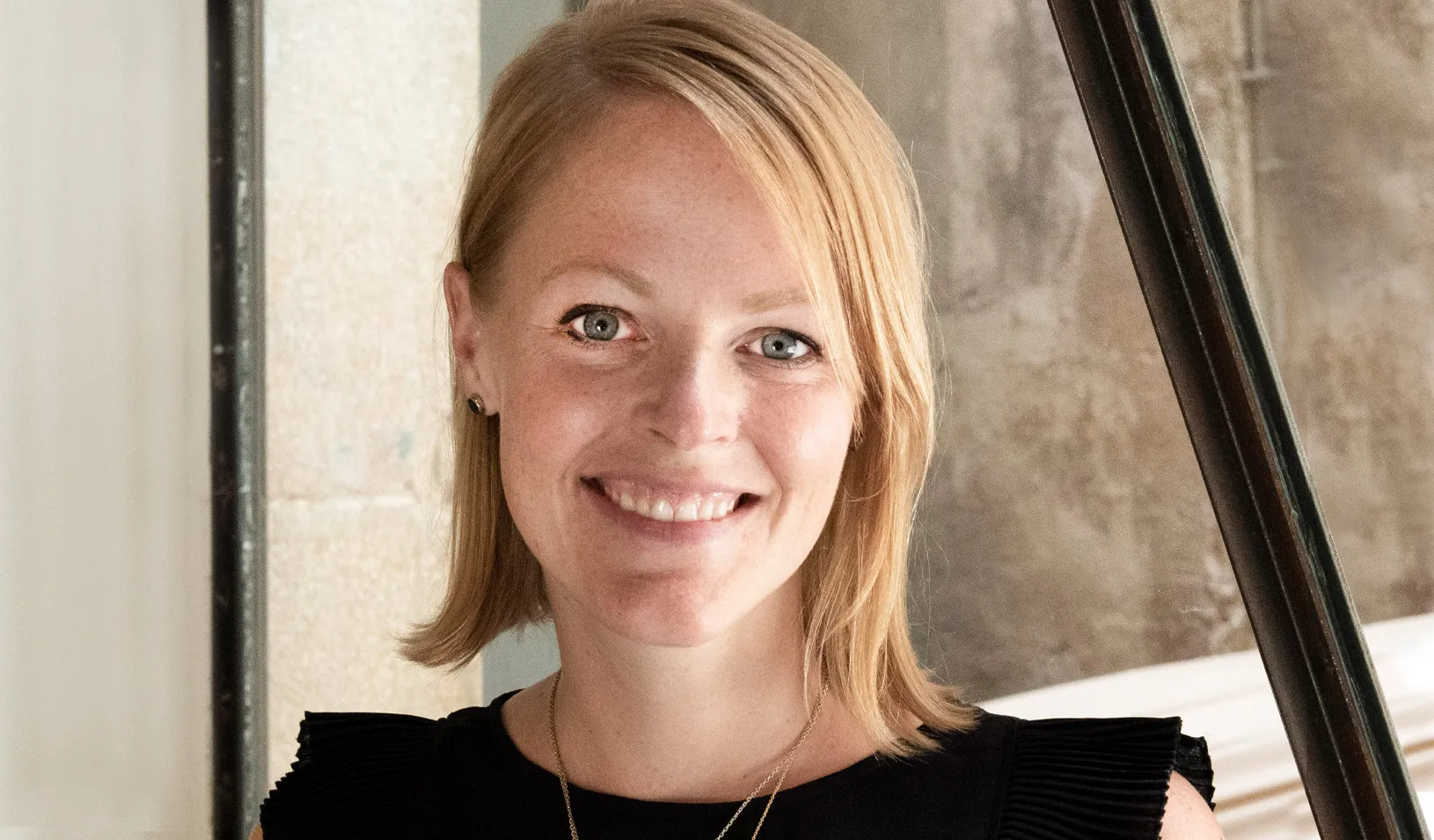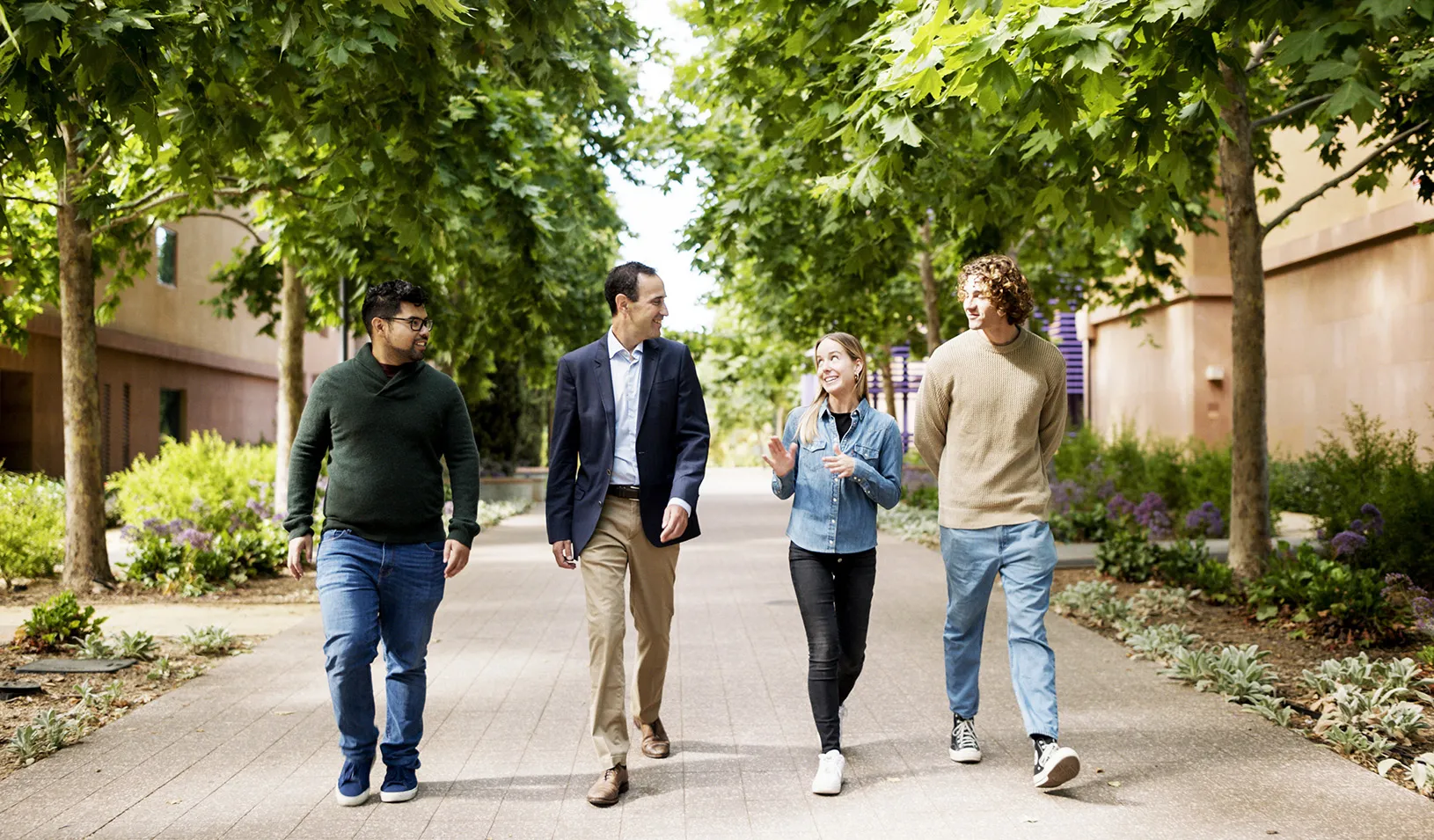Why This Ukrainian Parliament Member Became “A Spare Fighter with a Gun”
Legislator Kira Rudik says a military victory is the only way to save her country.
May 06, 2022

Rudik: “We already know you can’t make deals with Putin.”| Yevhenii Zavhorodnii
Sitting in her home office in Kyiv, Kira Rudik points over her shoulder to the window nearby. “See the tape?” she asks, noting the butterfly pattern of the adhesive meant to prevent the glass from shattering. “And my Kalashnikov is right here next to me,” she adds matter-of-factly.
Three months ago, Rudik, a member of the Ukrainian Parliament, was working on legislation to protect animals. Now she is taking steps to protect herself from the Russian invaders who she says would execute her if they had the chance. “Every member of Parliament is on a kill list,” she says. “My house will be taken, everything that I love here and I worked so hard to get, it will all be gone.”
Rudik, who in 2018 attended the Executive Program in Women’s Leadership at Stanford GSB, was elected to the parliament in 2019 after the IT company she helped run, Ring Ukraine, was purchased by Amazon. Now she is directing the same fiery energy that produced business success toward getting the international support and armaments needed to help her country survive.
She has remained in Kyiv throughout the war, resisting the temptation to flee to a safe zone. “All of us had to make the same decision, whether to stay or go,” she says. “I felt I could do more to help by staying here.”
There are many heartbreaking outcomes that have resulted from the war. In your quiet moments, where do your thoughts go these days?
We were working so hard to make a different future. We came from nothing; we’re trying to shake off the poverty and despair of the past. We wanted to raise a generation of children who didn’t know war. There are so many children here who have seen dead bodies, who have had terrible trauma. Mothers who were hiding in the bomb shelters were telling their children their blood type in case they were wounded. What do you say to your child when he says, “Mommy, are we refugees?”
Where were you and what were you doing when the war broke out?
We had been debating legislation about banning fireworks because they are bad for veterans, bad for the elderly. So on the morning that the war began and I heard explosions outside and my house was shaking, I thought, it must be fireworks. Two days later, I was standing there carrying my Kalashnikov and just completely shocked thinking, OK, now I have to train.
What is your role now? Is Parliament still working?
In the beginning there was a continuous bombardment of Kyiv and the priority was keeping people alive. Right now, the situation is very different. As the fighting moved to the east, I’m almost back to being a political leader rather than being just a spare fighter with a gun. We have had enough time now to get organizations in place and to turn the chaos into a process. My government ID was a huge deal because I was able to get people to listen while organizing refugee transportation or bomb shelters.
What is your view of the response by the United Nations and the international community?
The international institutions that we had so much hope for turned out to be useless. What are the UN’s actions? Writing angry emails to Putin. We are getting help from NATO countries, but not from NATO as an organization. Tyranny can move very fast and can be very effective, especially in wartime. Because while NATO is gathering once every two weeks to discuss what to do, Putin has already taken two cities. It turned out that instead of talking to these institutions, you should be talking to specific countries and their specific leaders. The direct contacts were much better; they work. The international organizations, especially the ones that were made specifically for world security, they failed. And they are failing now.
You’ve been very outspoken about the need to stop buying Russian fuel.
Right now the Russians are doing fine because the European countries are still paying them a billion dollars a day for gas and oil. So when Biden — with all my respect and thanks — says “we are sending 800 million dollars of military support,” this is less than European countries pay in one day to Russia. Who is supporting whom?
The specter of a nuclear exchange is now a subject of conversation. How do you reconcile the calls for greater NATO involvement in the war effort with worries about Putin blowing everything up?
We kept hearing that NATO cannot give you any weapons, because they are so afraid that Russia will use their nuclear weapons. OK, so what is the plan? Are you going to leave us high and dry and say, “Yeah, sorry about that, we are so afraid of Putin?” All the intelligence in the world will tell you that the chances of Putin hitting the red button is much less than the Russians creating an incident at one of the Ukrainian nuclear stations. They were occupying Chernobyl, and they bombarded the Zaporizhzhia nuclear station, which is the largest one in Europe. We were so close to nuclear catastrophe, and if we had weapons that would let us protect our skies, we could have protected our nuclear stations. We never asked for NATO troops; we just need the weapons to defend ourselves.
Are you surprised by the ferocity of the resistance of the armed forces and the country as a whole?
Putin’s plan was to take Kyiv in five days. That’s what we heard on day one. They thought they were coming here as liberators, but every single person fought back. Before the war, we were divided by our disagreements, but the war has united us. There were many who joined the resistance, the territorial defense, and many of them paid for it with their lives. There were many who went to the West to help the refugees and get them humanitarian aid. Another line of people was working to make sure that our army had supplies. We have an IT army taking down Russian infrastructure. There were people who said, “I am good with children, so my goal is to take as many children as we can from the East to the West.” In all these cases, people asked themselves, “Where can I be the most useful tool for my motherland?”
What sort of trade-off could you live with in a peace agreement?
We are not giving up any territory. For the last 20 years, we have seen that Russian forces are not going back from the places that they attacked. If you look at Georgia, if you look at Kazakhstan, Belarus, they come and they sit there. We know that the only way for Russian soldiers to go back is to militarily push them back. There is no way Putin says, “OK, we are pulling back the troops.” No way. The thing is, we already know you cannot make deals with Putin. Who will make sure that he will act on his word?
Ukraine’s resolve has inspired much of the world and reminded people who live in free societies why they value that freedom. Are you proud that Ukraine has come to represent a bulwark against autocracy?
Yes. This is a fight between tyranny and democracy. Are we going to go back to building empires or are we moving to the future? Do we believe in a world where the country with lots of guns can do whatever it wants? We are paying with our lives to answer these questions. Three months ago, words like freedom, freedom of speech, identity, they were very important, but they were mostly buzzwords. Like when you’re singing the national anthem every week without really thinking about what it means. Now I know exactly what it means. When I stand under the Ukrainian flag, I think about how many people paid with their lives so that we can keep that flag hanging.
Any final thoughts?
Everybody likes this comparison about David and Goliath, and we like it, too, because the person who wasn’t supposed to win wins. But David had a much bigger story than just that fight. He went on to become a king. This is what I want for my country — a story that goes on long after the battle is over.
For media inquiries, visit the Newsroom.
Explore More
Erin Nixon Joins Stanford GSB as Assistant Dean of Admissions

Nia Rose Froome, MBA ’23: Making Local, Fresh Food Available for All

New Research Fund Promotes Responsible Leadership for the Next Century
